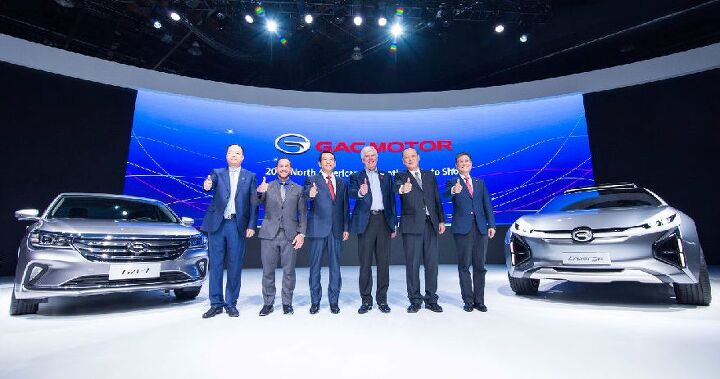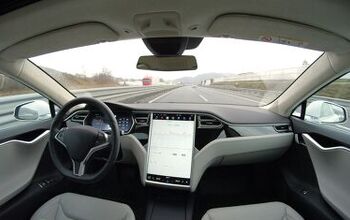The GAC Effect: Imported Chinese Automobiles Face Fierce Criticism From U.S. Politicians

At this very moment, Chinese-based automaker GAC has a massive booth in the very center of the North American International Auto Show in Detroit. The company has expressed its intent to start importing its vehicles into the United States in 2019. However, 536 miles away (by car), Washington is bemoaning Chinese trade practices — a topic which might be extremely relevant for Guangzhou Automobile Group in the coming years.
On Wednesday, Democratic U.S. Senator Chuck Schumer and President Donald Trump separately criticized China’s trade policy. For automobiles, this translates into Chinese-built cars incurring a maximum 2.5 percent import tariff upon entering the United States, while U.S.-built cars sent East are hit with an average 25 percent tax.
One way around this is for American manufacturers to partner with a Chinese automaker and assemble vehicles in-country. Of course, this doesn’t bolster U.S. jobs, and it gives the locals a front-row seat on exactly how to build an American car. Unfortunately, there really is no other alternative. Chinese law stipulates that foreign subsidiaries must operate as a 50-50 joint venture with an established Chinese firm.
Trump told Reuters in a Wednesday interview that “we have helped to build China because they have taken out so much money in terms of trade deficits with this country.” He continued by saying “when China or another country charges us 50 percent tariffs — more than that in some cases — and we charge them nothing, that’s not fair. That’s not fair.”
Schumer was in agreement. While he and the president have very little in common politically, they seemingly reached the same conclusion in regard to China’s trade policies. Specifically referencing to GAC’s plants coming to America, Schumer took to the Senate floor on Wednesday to condemn Chinese automotive trade rules as “manifestly unfair, and a typically unfortunate example of China’s rapacious trading policies.”
This could spell fierce opposition for Chinese-based manufacturers hoping to sell in the West. But how critical of an issue it will be in the near future is debatable. While GAC appears more ready than ever to make a move to North America, the company previously stated it wanted to begin selling vehicles in the United States in 2017. Obviously, that earlier goal went unmet.
However, it’s showing at the Detroit Auto Show for this year was a no-nonsense affair — rivaling the likes of Hyundai and Subaru in scale. In 2017, GAC Motor established its North American R&D center in California and hosted job fairs in Silicon Valley, Detroit, and Boston. This year, it announced it will commence another round of recruitment programs in America to attract talent, with a plan in place to attend the annual convention of the National Automobile Dealers Association for the first time in its history.
The automaker has even announced plans to change the name of its flagship Trumpchi brand i n the Western market to avoid confusion with the president. While we felt the move was overkill, the company is very serious about it. In Detroit, we referenced the Trumpchi name aloud and a GAC PR representative came over, hands waving, to politely inform us that the name will be altered.
“We look forward to the increasing attention and support worldwide,” said GAC President Yu Jun in a recent announcement. “In our pursuit of the North American market, GAC Motor stands ready to share our high-quality products and work with all of you to create a better life of mobility.”
Are China’s trade-practices unfair to the United States? Yeah, probably. However American-based manufacturers are unlikely to gripe too much, as they don’t want to be shunned from the global car market. That leaves politicians to do the dirty work, and it looks as if they’ve already begun.
[Images: GAC Group]

A staunch consumer advocate tracking industry trends and regulation. Before joining TTAC, Matt spent a decade working for marketing and research firms based in NYC. Clients included several of the world’s largest automakers, global tire brands, and aftermarket part suppliers. Dissatisfied with the corporate world and resentful of having to wear suits everyday, he pivoted to writing about cars. Since then, that man has become an ardent supporter of the right-to-repair movement, been interviewed on the auto industry by national radio broadcasts, driven more rental cars than anyone ever should, participated in amateur rallying events, and received the requisite minimum training as sanctioned by the SCCA. Handy with a wrench, Matt grew up surrounded by Detroit auto workers and managed to get a pizza delivery job before he was legally eligible. He later found himself driving box trucks through Manhattan, guaranteeing future sympathy for actual truckers. He continues to conduct research pertaining to the automotive sector as an independent contractor and has since moved back to his native Michigan, closer to where the cars are born. A contrarian, Matt claims to prefer understeer — stating that front and all-wheel drive vehicles cater best to his driving style.
More by Matt Posky
Latest Car Reviews
Read moreLatest Product Reviews
Read moreRecent Comments
- 3-On-The-Tree My 2009 C6 corvette in black looks great when it’s all washed and waxed but after driving down my 1.3 mile long dirt road it’s a dust magnet. I like white because dust doesn’t how up easily. Both my current 2021 Tundra and previous 2014 Ford F-150 3.5L Ecobomb are white
- Bd2 Would be sweet on a Telluride.
- Luke42 When will they release a Gladiator 4xe?I don’t care what color it is, but I do care about being able to plug it in.
- Bd2 As I have posited here numerous times; the Hyundai Pony Coupe of 1974 was the most influential sports and, later on, supercar template. This Toyota is a prime example of Hyundai's primal influence upon the design industry. Just look at the years, 1976 > 1974, so the numbers bear Hyundai out and this Toyota is the copy.
- MaintenanceCosts Two of my four cars currently have tires that have remaining tread life but 2017 date codes. Time for a tire-stravaganza pretty soon.



































Comments
Join the conversation
Trumpchi? We need the Hongqi!
The problem is that China may reduce their tariffs today after their previous tariffs have already accomplished their goals. Too late, damage done! The US should have a policy that states “free trade” with a mirror policy. This means we should adopt free trade however implement our trading partners policies if they do not practice free trade. That mirror trade policy should go back to the tariffs and restrictions that were implemented 8 years ago. Using that policy, China would be charged a 25% tariff on vehicles today. If China lowered that tariff to zero, it would take 8 years before they would get a zero tariff here.